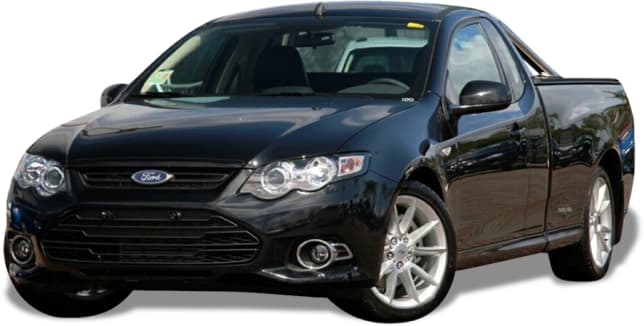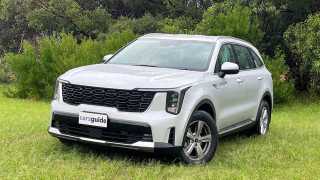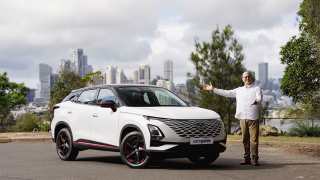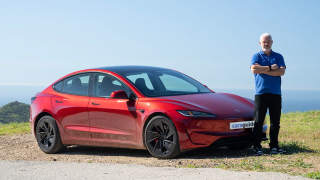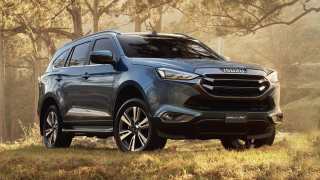
Family Sedans 2013 Review
- Ford Falcon
- Mazda 6
- Hyundai i40
- Mazda 6 2013
- Ford Falcon 2013
- Hyundai i40 2013
- Ford Falcon Reviews
- Mazda 6 Reviews
- Hyundai i40 Reviews
- Ford Reviews
- Hyundai Reviews
- Mazda Reviews
- Ford Sedan Range
- Hyundai Sedan Range
- Mazda Sedan Range
- Sedan
- Ford
- Hyundai
- Mazda
- Family Cars
Large sedan cars may not be flavour of the year but don't be deceived - most fit your family perfectly and can make economical sense.
Sales of the big-car segment are down almost 30 per cent as buyers gravitate to smaller cars and SUVs. But the trend may be based more on a presumption that large cars are simply too large for the city.
The truth is that this trio of family cars are similar in length, space and towing ability. They have turbocharged four-cylinder engines, automatic transmissions and seating for five adults and generous luggage areas.
Yet there's a technicality. One - the Falcon - is regarded as a large car and the other two are classed as medium-size cars. That's despite a difference in length of only 225mm - the length of an envelope - and a marginally wider body.
Why is a Falcon in this comparison? Because with the 2-litre, four-cylinder EcoBoost engine it makes a solid rival to the Mazda6 and the Hyundai i40.
Diesel versions of the Mazda and the Hyundai are chosen here simply because they're better than their petrol counterparts in terms of performance and economy. The Falcon has a petrol engine - there's no diesel option - and though sales of the Falcon nameplate are on the slide, I think the EcoBoost model is a hidden gem.
On the sales chart, the new Mazda6 has a 20 per cent stake in the medium-car class, well ahead of the Hyundai i40 with 6.5 per cent and second only to the Toyota Camry (27.6 per cent). Hyundai sales are expected to grow as it stops selling the i45, a sedan very similar in specifications to the i40. Ford's Falcon has 24.8 per cent of the large-car segment and though it is more popular than the Mazda6, its sales are falling and now about 27 per cent less than a year ago.
Yet the EcoBoost Falcon has a lot of redeeming features. The engine is so good that few drivers would think it was a four cylinder. It has better economy than its six-cylinder sister - which incidentally is exactly the same price ($40,835 for the G6) - and cheaper to service ($835 for three years versus $885).
The Hyundai i40 is the Euro-styled sedan with the choice of a so-so 2-litre petrol engine or, as tested here, with the far more enjoyable 1.7-litre turbo-diesel. It's roomy, very well equipped, comfortable and looks great.
New boy on the block, the Mazda6, is a big car with clever engineering aimed at low fuel consumption and emissions. But it's a smart diesel-fuelled sedan that neatly combines family accommodation with a sporty driving character.
The specifications here are mid-range that avoid the low-rent equipment list and appearance. You won't be embarrassed driving into the portico of the Hilton in any of these. But for buyers who want more, each has another, more expensive, model with additional indulgences.
VALUE
Each costs around $40,000 and while that may be a bit above what a family may want to spend, the price buys a lot of car and - in general - a lot of features. But I'm a bit disappointed with the Falcon G6.
The feature list is good but pales against the other two. You have to spend a further $6000 to upspec to the G6E to get a reverse camera, leather seats, sat-nav and other bits - all of which are standard in the Mazda6 Touring and Hyundai i40 Elite. It is the area of value-for-money where the Aussie falls down, certainly not in the engineering department where the EcoBoost not only provides more verve, but feels more sure-footed.
There is a similar feature list in the Mazda and Hyundai, including dual-zone climate-control airconditioning, trip computer, high-end audio (the Mazda boasts the most with an 11-speaker stereo) and leather upholstery. In this list, the Falcon G6 gets only the trip computer.
Capped price servicing is available at Hyundai and Ford dealers and the Korean kicks it up a level by its five-year, unlimited distance warranty which the other two can't touch.
However, over three years, the Ford is the cheapest to service. Mazda doesn't have capped servicing but is well behind the eight-ball as customers increasingly demand a transparent service deal.
Subaru is the other company without the program - though it may soon start - while Volkswagen started its program a few days ago.
WINNER: Hyundai
DESIGN
The Ford is a well-balanced, logical design that in the FG MkII version is almost European in its lines. The deep grille helps stamp its authority on the road while the cabin is neat and friendly with a driving position that suits most shapes. Because it's taller than its rivals, it's also a far easier car to get in and out of and that especially suits older people.
The Hyundai and Mazda are less conservative than the Falcon and clearly show they are products of the current era with long, low and sleek bodies. Hyundai's i40 is a cleaner design than the outgoing i45. Its dashboard is busier than the Falcon and there's some misplaced switches, but I appreciate the space offered by using a small electric park brake switch - rather than the bigger manual hand brake lever - and plentiful cupholders.
The Mazda feels more like a sports car and some (larger) drivers thought the driver's zone felt a bit cramped. Part of that is illusion created by the near-all black dash. Regardless, it's the best dash here - not because it's simple, for it's not - but because it has all the right stuff in the right place.
WINNER: Mazda
ACCOMMODATION
The Falcon wins the boot wars with a 535-litre area (rear seat up) but has a space-saver spare wheel which helps gain extra room. By comparison, the Hyundai has a full-size spare and a 505-litre boot and the Mazda (with a space-saver) has a smaller 438-litre boot.
The Mazda's smaller luggage area is despite the car having 105mm extra length and a 60mm longer wheelbase. It's a pity Mazda didn't continue with its flexible Mazda6 liftback model, though it argues space-watchers will opt for the wagon.
The Falcon has the longest wheelbase - though is only 8mm more than the Mazda6 and 68mm up on the Hyundai - which helps make its the more accommodating for rear seat room and boot space. Blame my body if you must, but I felt more at home in the Falcon.
The seats are softer, the driving position more “open” and roomy, and it's easier to adapt to the larger glasshouse, the extra visibility and the simpler dashboard environment.
WINNER: Ford
TECHNOLOGY
Ford's EcoBoost tag is applied to its turbo-petrol engines, in this case a 179kW/353Nm 2-litre unit that is also used in some Focus and Mondeo models as well as by Volvo. It's brilliant - so much so that a driver can barely pick it from the common 4-litre six-cylinder Falcon engine. It drives the rear wheels through a six-speed sequential auto transmission and at this point the chassis is virtually identical to the other Falcons.
The turbo-diesel Hyundai and bi-turbo diesel Mazda are front-wheel drive cars also with six-speed automatics. The Hyundai is the smallest engine at 1.7-litres though is a crisp and torquey unit pushing 100kW/320Nm.
The Mazda6's engine is part of the company's SkyActiv technology and has two small turbochargers driving a 2.2-litre engine with 129kW/420Nm. The car has a new capacitor energy storage system to boost battery power to cater for the stop-start system. SkyActiv is also applied to the suspension and body and while it rides as competently as the others, its big impact is in vehicle weight.
At 1503kg the Mazda6 diesel is 145kg lighter than the Ford and 123kg down on the Hyundai. This affects handling as much as fuel economy and, in the latter department, the Mazda6 averages a mere 5.4 litres/100km. In comparison, the Ford's figure is 8.1 L/100km and the Hyundai is 6.0 L/100km.
WINNER: Mazda
SAFETY
Buyers, especially those seeking a car for the family, demand top-shelf safety. These three don't disappoint with each having a five-star crash rating and plenty of sheet metal to help ward off intruders.
Electronic stability and traction control, brake assist and ABS brakes, a rear park sensor and a minimum of six airbags (the Hyundai has nine) are standard.
The Hyundai and Mazda add reverse cameras and front park sensors, while the Hyundai gets daytime running lights.
Only the Hyundai has a full-size spare wheel though Mazda has an “adult-sized” temporary spare that puts more tread on the road than some motorcycle-tyre sized examples.
WINNER: Hyundai
DRIVING
Don't think that a diesel always falls behind a petrol engine in terms of driver enjoyment. The Mazda is the best performer in terms of linear power delivery - it has two turbochargers and their urge is felt right down from idle with a strong kick in the mid-range, just about where you want to be when overtaking another car. It's the biggest-capacity engine here but the story is about its torque. At 420Nm, it's a real pumper that makes driving so effortless and - at speed at least - so quiet.
The Hyundai's engine is also a very predictable unit but it doesn't have the capacity or technology of the Mazda and isn't as responsive. I'll add that driving the kids around the suburbs isn't a race and the Hyundai does the job more than sufficiently.
For real engine smoothness and quietness, however, it's hard to beat the Falcon's EcoBoost unit. The silky way the petrol engine produces its power also benefits the gearbox's upchanges which are also less detectable than the Mazda or Hyundai. But that is more likely attributable to the torque-rich, low-speed character of the diesel engines.
There's nothing wrong with the Hyundai's delivery, it's just not as quick as the others. The fact that the Falcon is the only petrol-fuelled car here means it can't keep up with the miserly consumption of the Mazda and Hyundai diesels.
Ride comfort goes to the Falcon, mainly thanks to its softer foam in the seats but also because of the more spacious driving position. The suspension is more compliant and less prone to low-speed bump harshness that was evident - marginally - in the Hyundai and Mazda.
The Falcon's steering is more positive and has excellent road feel compared with the electric-assist steering of he others that tended, in some cases, towards vagueness. But the Falcon is hampered by weight.
By comparison, the Mazda feels lithe and eager and the driving position is bait to go out and enjoy the car. Top marks to the Hyundai, but it doesn't evoke the Mazda's lust for having fun in a car.
WINNER: Mazda
VERDICT
The Falcon's engine is its shining light. The car makes sense but its feature list is poor and so its value for money suffers.
The Hyundai's ownership costs and extended warranty will give confidence to long-term buyers, as will its solid engine and meagre fuel thirst.
The Mazda and Hyundai are neck and neck but across the line, the Mazda gives more. It's a big car but it is both comfortable and very driver friendly while its technology is spot on for today's market.
It does, however, need to have a capped-price service deal. More importantly, it was the one I really wanted to drive.
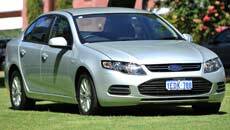
Price: from $40,835
Warranty: 3 years/100,000km, roadside assist
Resale: 40%Service interval: 12mths/15,000km
Service cost: Capped price, $835 for 3yrs
Safety: 6 airbags, ABS, ESC, EBD, TC
Crash rating: 5-stars
Engine: 2-litre 4-cyl turbo-petrol, 179kW/353Nm
Transmission: 6-spd auto; rear drive
Thirst: 8.1L/100km; 95RON; 192g/km CO2
Dimensions: 5.0m (L), 1.9m (W), 1.5m (H)
Weight: 1648kg
Luggage: 535-litres
Spare: Space-saver
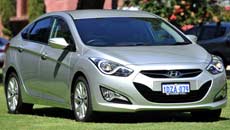
Price: from $39,590
Warranty: 5 years/unlimited km
Resale: 44%
Service interval: 12mths/15,000km
Service cost: Capped price, $987 for 3yrs
Safety: 9 airbags, ABS, ESC, EBD, TC
Crash rating: 5-star
Engine: 1.7-litre 4-cyl turbo-diesel, 100kW/320Nm
Transmission: 6-spd auto; front drive
Thirst: 6.0L/100km; 159g/km CO2
Dimensions: 4.7m (L), 1.8m (W), 1.5m (H)
Weight: 1626kg
Luggage: 505-litres
Spare: Full-size steel
Price: from $40,350
Warranty: 3 years/unlimited km
Resale: 50%
Service interval: 6mths/10,000km
Service cost: No
Safety: 6 airbags, ABS, ESC, EBD, TC
Crash rating: 5-star
Engine: 2.2-litre 4-cyl turbo-diesel, 129kW/420Nm
Transmission: 6-spd auto; front drive
Thirst: 5.4L/100km; 143g/km CO2
Dimensions: 4.9m (L), 1.8m (W), 1.5m (H)
Weight: 1503kg
Luggage: 438-litres
Spare: Space-saver
Pricing guides
Range and Specs
| Vehicle | Specs | Price* | |
|---|---|---|---|
| (LPI) | 4.0L, LPG, 6 SP AUTO | $13,640 – 17,930 | 2013 Ford Falcon 2013 (LPI) Pricing and Specs |
| (base) | 4.0L, —, 6 SP MAN | $9,900 – 13,530 | 2013 Ford Falcon 2013 (base) Pricing and Specs |
| G6 Ecoboost | 2.0L, —, 6 SP AUTO | $8,910 – 12,540 | 2013 Ford Falcon 2013 G6 Ecoboost Pricing and Specs |
| XT Ecoboost | 2.0L, —, 6 SP AUTO | $10,120 – 13,860 | 2013 Ford Falcon 2013 XT Ecoboost Pricing and Specs |
$9,985
Lowest price, based on 175 car listings in the last 6 months













